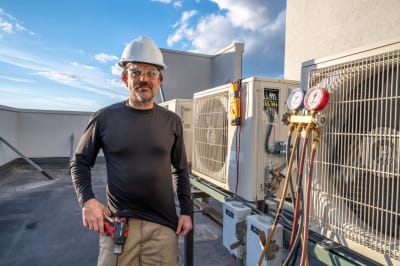HVAC technicians are professionals with an in-depth understanding of air conditioning and heating systems. These professionals are called upon to work in various environments, including commercial and residential buildings.
In Hawaii, HVAC technicians are in high demand, and the employment rate is set to continue increasing over the coming years. As a state resident who would like to pursue a career in this field, there are a few important requirements and a few that facilitate career opportunities.
The following sections explore all of these and more. They include details concerning top programs and annual average salary ranges grouped by multiple brackets.
How to Become an HVAC Technician in Hawaii
The following are the requirements needed to become an HVAC technician in Hawaii.
High School Diploma or GED
Prospective HVAC technicians in Alaska are expected to have a high school diploma or a GED test equivalent. This will allow them to secure admission into their training program of choice regardless of which approach they would like to take with their education.
Educational Pathways
Regarding HVAC technician education, candidates must decide between several pathways. They include the following:
- Academic Training—Academic training is advisable for HVAC technicians and for any other trade profession. It gives candidates an edge in the employment market because of the valuable experience and credentials obtained from these institutions.
- On-the-Job Training—In addition to academic training, an HVAC technician can receive education “on the job” via an apprenticeship or by working under a master technician. This approach also has advantages, including opportunities for mentorship and networking with experienced professionals in the field.
- Combination Approach - The last approach to becoming an HVAC technician in Alaska combines academic and on-the-job training. This way, candidates can gain the best of both worlds and develop expertise in theoretical and practical applications.
Explore trades with similar paths:
Licensure & Certification Requirements
The state of Hawaii expects HVAC technicians to acquire a license only if they take on large contracts. Pursuing a license is unnecessary for those who will not own businesses and work under licensed contractors.
To acquire a contractor license as an HVAC technician in Hawaii, candidates must go through the Department of Commerce and Consumer Affairs Professional and Vocational Licensing Division.
The steps and requirements needed to obtain a contractor license in Hawaii involve choosing a specialty focus (including ventilation, refrigeration, sheet metal, and more), accumulating 4 years of experience in a supervisory role, sending in an official application, paying the application fee, and passing the state-mandated examination.
Additionally, HVAC technicians who handle refrigerants nationwide must obtain certification from the Environmental Protection Agency (EPA).
Top HVAC Technician Schools in Hawaii
The programs below are appropriate for aspiring HVAC technicians in Hawaii.
Honolulu Community College
Honolulu, HI Online Only
Honolulu Community College has an HVAC technician program that is one of the best in the state. Students may opt for the associate of applied science program in Refrigeration and Air Conditioning Technology or certificate programs.
Tuition
$131 - $345 per CreditContact
(808) 845-9211
honcouns@hawaii.edu
Hawaii Job Corps
Waimanalo, HI Campus Only
Hawaii Job Corps Center in Honolulu offers an excellent Building Construction Technology pre-apprenticeship program for interested individuals.
Tuition
FreeContact
(800) 733-5627
Kauai Community College
Online, HI Online Only
Lastly, those seeking online training may apply for the Foundations of Plumbing program at Kauai Community College.
Tuition
$2,895 per ProgramContact
(855) 520-6806
Explore HVAC technician schools in Hawaii by City:
Salary & Career Outlook
The annual average salary of an HVAC technician in Hawaii is $63,508. This was revealed by a survey of professionals in the state published on Indeed. The data shows that this figure is relevant for candidates among the median earners.
Professionals can earn below or above this number, putting them in the bottom 10% or the top 10% bracket. Those in the formal category manage an annual average salary of $44,849. In contrast, those in the latter category will earn an annual average salary of $89,929.
Factors like experience, location, and professional credentials can help candidates improve their annual average salary and move from a low-earning category to a high-earning one.
Concerning location, the best places to work as an HVAC technician in Hawaii (based on income only) are Lihue, with an annual average salary of $106,727, and Pearl City, with an annual average salary of $106,717.
The projections for the future are also favorable. The BLS expects a 9% increase in employment rate over the next 10 years.





